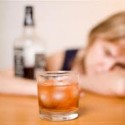Binge drinking starts at five
Regular alcohol consumption can lead to binge drinking among all gender and age groups, a new study suggests.
“What we found is that when people drink more often, they are more likely to drink more, take more drinks, and go to binge drinking,” said Andree Demers of Universite de Montreal, the study’s main researcher.
She classified binge drinking as five drinks or more per occasion.
“Usually you take one or two drinks,” she said yesterday. “If you want to celebrate, you’re going to take two or three or four or five drinks.”
The study was conducted by researchers from the Universite de Montreal and the University of Western Ontario and published in the latest edition of Addiction.
The study established one drink as either five ounces of wine; 1.5 ounces of liquor; 12 ounces of beer or cooler; or three ounces of port, sherry or vermouth.
About 11,000 respondents — 5,743 women and 4,723 men — were asked to report on their alcohol consumption over a year. The data was gathered by the Genacis Canada project, an international collaboration looking at how social and cultural differences can influence drinking habits.
Demers said women tend to drink less than men.
Demers says the study is relevant given other studies that tout the health virtues of a moderate amount of beverages such as red wine.
“With all this publicity of having one glass, there is no problem with this, and drink moderately, we get the idea that we can drink every day and that’s OK,” Demers said.
“Of course that can be OK, but what we are saying is that there is a risk that people will start to drink more often in a heavy way on some occasions.”
Catherine Paradis, also a professor at the Universite de Montreal, pointed out regular drinking builds up tolerance.
“Therefore, daily drinkers will need more than their usual drink or two to make a difference with everyday life and gain that festive feeling. That fosters drinking beyond healthy limits — at least sporadically.
“The safe amount is always the same thing — one or two drinks per day, not more, and no intoxication.”and perhaps weekly — to five drinks or more per occasion.
“And five units is above the recommended limits of healthy drinking.”
source: London Free Press

